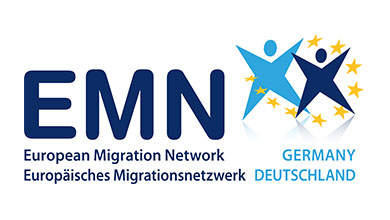Irregular migration and voluntary return ,
 Source: BAMF
Source: BAMF
The study compiles recent data on the scale of irregular migration in Germany as well as on voluntary and forced returns. Furthermore, relevant actors, their channels and challenges of disseminating information on voluntary return to irregular staying third-country nationals are described.
Irregular migration in Germany
Following recent estimates, in 2014, between 180,000 and 520,000 immigrants have been staying irregularly in Germany. In principle, they are obliged to leave the country. Measures of assisted return and forced return thus make up an essential component of German and European asylum and migration management policy albeit voluntary returns categorically take precedence over forced returns.
Actors in return counselling and the dissemination of information
There is great diversity in actors nationwide when it comes to the organization of, counseling about and the dissemination of information on voluntary return. Besides the distinction between governmental and non-governmental actors, it is possible to differentiate between the scope of the actors’ activities (international, nationwide, Federal State-wide, municipal) and the target group of the counseling as well as the information available. Strategies of the single actors on disseminating information vary strongly, in particular with regard to multilingualism.
In 2014, the Coordination Agency for ‘Integrated Return Management’ of the Federal Government and the Federal States was founded. The purpose of the Coordination Agency is to provide a framework in which to develop a strategy on more efficient assistance, the implementation and linking of voluntary return, reintegration and forced return, as well as to develop common standards and practical directions for action.
Challenges of disseminating information
Besides a lack of long-term financial security with regard to return counseling centers and projects, the actors list further challenges. These encompass uneven regional distribution of governmental and not-governmental return counseling centers in Germany, as well as the short period that is allowed for departure for third-country nationals who are obliged to leave the country. Furthermore, the willingness of the relevant actors to cooperate with each other and the oftentimes limited voluntariness of the persons concerned play a crucial role.
Working Paper 65 was drawn up by the national contact office of the European Migration Network (EMN) located in the Federal Office for Migration and Refugees (BAMF) as Germany's contribution to a Europe-wide comparative investigation and co-financed by EU funds.
Study compiled by: Janne Grote

